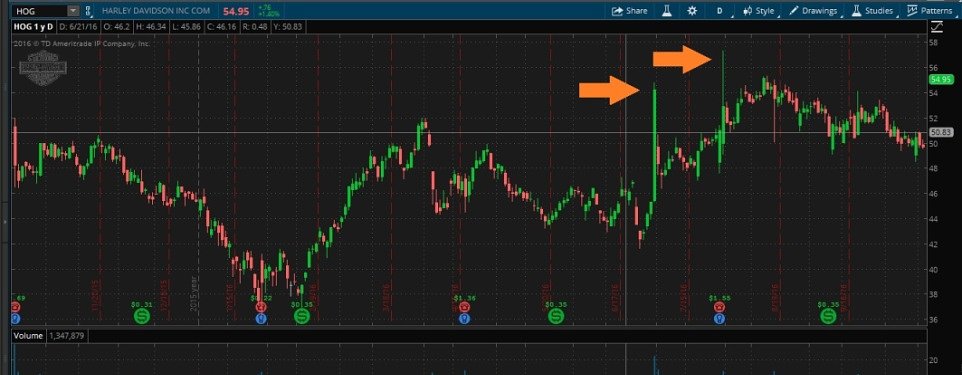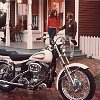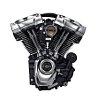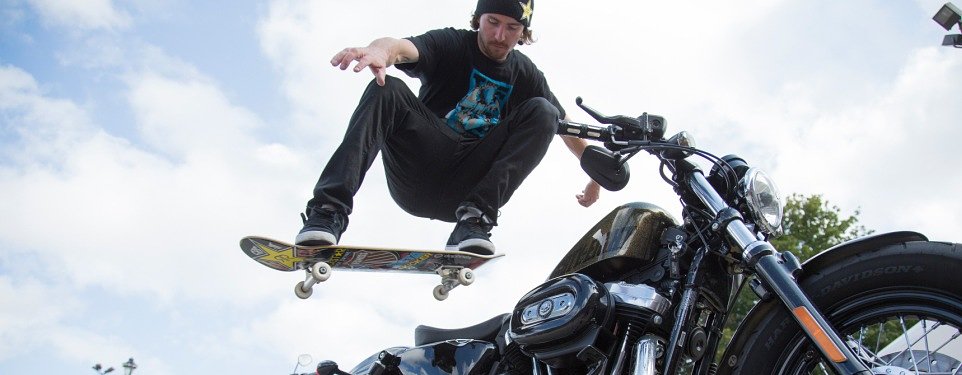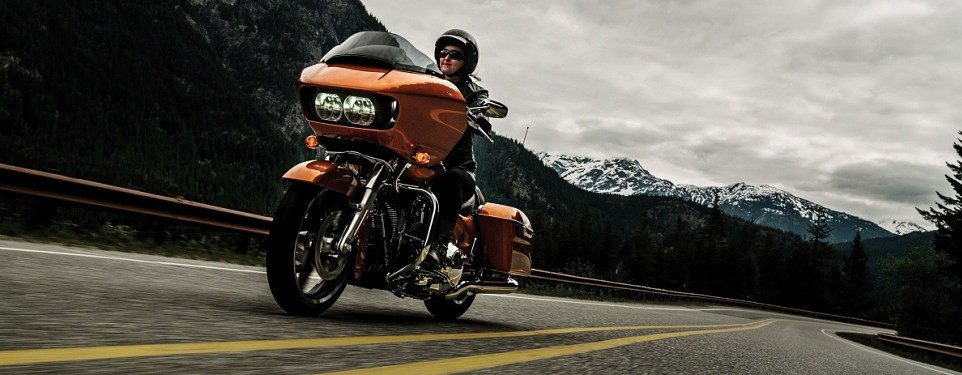Back in July, Harley-Davidson’s stock jumped almost 20 percent due to speculation that the company could be acquired by private-equity firm Kohlberg Kravis Roberts (KKR), presumably through a leveraged buyout.
I heard the rumor, too, and kind of ignored it. Rumors on Wall Street make me yawn. However, late in September, the same rumor floated up again, driving the stock price up once more. I pricked up my ears.
Harley refused comment in July, but after the September run-up, they actively denied knowledge of a takeover bid.
"There isn't anything going on on this end that we're aware of to specifically drive that," a company spokesperson told Business Insider, with regards to the stock price heading north.
The fact that H-D moved from refusing to comment to actively denying the takeover says to me that this deal ain’t gonna happen. But that does not mean that it couldn’t happen with a different firm, and it also doesn’t mean that they’re not seeking assistance in the form of a business partner that’s not a PE outfit. The fact that these rumors are cropping up doesn’t make me think Harley is getting in bed with KKR, but it does make me think they are shopping for business help.

The other element at play is that H-D announced quarterly earnings this week and continues to describe the landscape as “challenging,” with competitors discounting motorcycles in a way Harley rarely does. Sales and revenues were down in the United States and layoffs were announced, but the execs talked confidently about what the new Milwaukee-Eight could do for sales next year.
What are the possibilities?
Assuming H-D is looking for help, there are many options, which I discussed with financial columnist Tom Byrne. (If that name sounds familiar, it’s because Tom’s a regular reader and commenter here at Common Tread. He wanted me to stress that he is speculating. “I have no intimate knowledge of what is going on in the H-D C-suite,” he reminded me.)
In the rumored KKR scenario, KKR could purchase H-D, try to generate some value through leaning out the company, and then spin it off in a few years. That’s the standard recipe for an LBO, but there are two problems with that scenario in H-D’s case: today’s debt and the future endgame.
“HOG has much balance sheet leverage, 77.75 percent last quarter,” Tom said. “This means an LBO by a firm such as KKR, or anyone else, could prove difficult because there is not much room for increased leverage for a leveraged buyout.”
“The [other] problem with an LBO is who would buy Harley from KKR?” Tom asks. “Maybe an Indian company, such as Hero or Tata. I believe they have the financial wherewithal and vehicle manufacturing knowledge to make a successful go of H-D.”
The problem with that is it seems almost a given that any purchase by a foreign entity would immediately alienate a sizable chunk of the core H-D customer base. Foreign ownership would be a bitter pill to swallow for management, shareholders, and customers alike.
The second scenario I see playing out is a bit more dire. Much like a swap-meet enthusiast realizing that a complete Panhead’s parts are worth more individually than together, a PE firm could come in and dismantle, maximizing value by selling parts of the business to firms that might not be able or eager to purchase H-D as a whole. There could be separate buyers for H-D’s motorcycle manufacturing plants, financial services division, and perhaps the clothing and accessories portion of the company. Tom had some thoughts on this storyline, too.
“Merchandise is a huge deal for HOG,” he said. “I doubt a buyer of the motorcycle division would be interested without the merchandise unit coming along. An HDFS spin-off to a bank or credit company makes sense, for both H-D and a financial institution.”

H-D is probably loathe to accept such a fate. Execs still remember buying back the company from AMF in the 1980s. Willie G. Davidson, for one, was a part of that transaction, and I cannot imagine him not rallying the troops to fight off any bean counter who proposes parting out the company. I could only imagine that being possible through an unfriendly takeover, which would be costly for the acquiring company. All said and done, there’s probably not enough meat on Harley’s bone to make such a transaction favorable. I also find the idea repugnant, personally.
Tom brought up the idea of Harley being purchased by another vehicle manufacturer. He pointed out that Suzuki is in talks with Toyota about some kind of sharing or partnership agreement. What about Harley and Suzuki joining forces, then?
“I do not believe it would ever happen. H-D is in no position to acquire anyone so I doubt the Suzuki idea would fly,” he said. “Harley could partner with another company to reduce costs and/or improve technology, but they’ve tried that. Aermacchi, and more recently, Porsche come to mind.”
What if a third party formed a parent company combining Suzuki and Harley? Imagine them operating separately, but allied under one roof. This would take a massive amount of capital or leverage and it would require a pretty hefty dose of both business acumen and motorcycle industry knowledge, but it could be very lucrative if done correctly. Would customers accept such a move? Unlikely, for quite a few reasons. I doubt there is a PE firm with the track record or chutzpah to take on so much exposure. Tom furthered my doubt with a different point.
“I doubt the Japanese would let a PE firm buy one of their major companies,” he said. Partnerships like Toyota and GM or Ford and Mazda are about the limit of what the Japanese government allows, he pointed out.
My final idea — and perhaps the one H-D is looking for — is that a PE firm could come in and actually do some good stuff without just gutting the carcass. Could a PE firm control some of the means of production, using H-D as a linchpin? What if, for instance, a PE firm acquired Harley-Davidson and also sought to pick up a parts or tire manufacturer? Imagine some other business inserted into the supply chain: maybe a transportation or trucking company, or perhaps a steel supplier. There are ways to make money by controlling more aspects of an industry, rather than simply squeezing one or two businesses much tighter.
What does it mean for riders?
What would any of these possibilities mean for riders of motorcycles? Well, it could mean anything. It could be no real change at all, if none of this occurs. It could mean the complete demise of Harley-Davidson motorcycles as a brand, if the company got “parted out.” Of course, it might mean Harley adventure bikes and race-reps, if they got real chummy with another motorcycle manufacturer. Or it might just mean a stronger H-D making the same products. The end result would be transparent to customers, much as if nothing at all happens.
Grist from the rumor mill makes excellent food for thought, eh?




